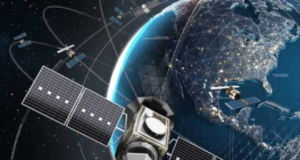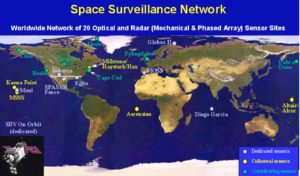The United States Space Force was created by President Trump in 2019, tasked with the mission of organizing, training, and equipping space forces to protect United States interests and to provide space capabilities to the joint force. While global superpowers are constantly trying to be at the forefront of technological innovation, the demand to protect our interests in
space is of utmost importance. Our satellites provide essential communications, weather and navigational, and data for ground, air and fleet operations. Our satellites also help detect threats from ballistic missile launches targeting the United States and North America. While the U.S. currently accounts for over 30% of operational spacecraft currently in orbit around Earth,
our intelligence capabilities that monitor and defend our space systems are not nearly as capable. More and more countries are not only traveling to space, but weaponizing space which is why the United States military must enhance its space-based capabilities. As threats only continue to rise, we need to increase our situational awareness and develop the capability
to gather intelligence on space related missions and threats. With nearly 70 countries occupying space in one way or another, our ability to defend and protect our satellites and systems from counter space weapons is paramount to our national security and stability. SPACECOM is the operational command in space, and even though U.S. intelligence agencies
are able to support warfare here on Earth, SPACECOM is challenged with a much more daunting task of providing intelligence to a variety of different national security space agencies throughout the Department of Defense, the intelligence community, and our allies. The current capabilities of U.S. intelligence analyses in space are lacking in both technology, and organizational coherence.
It is critical for the U.S. military and their counterparts to be able to identify threats by seeing them, which is what makes space so
difficult to protect. The need for space domain awareness capabilities is clear as countries like Russia and China have proven, over recent years and months, that they have no intention of reducing their footprint in space, nor any intention of reducing their warfare capabilities in space.

Moreover, because both operational intelligence and technical intelligence for space is so important, the Pentagon proposed spending $14 billion on space defense in 2020. With the growing need for space defense, the government is certain to turn to contractors like Praescient to fulfill some of their technological and intelligence needs. Today, we are living in a
modern space race and the demand for government contractors that can provide tech, intelligence, and warfare capabilities and defense to U.S Space Command is only growing. This new space race is opening doors for contractors like Praescient and will definitely be a top priority for Praescient in the coming years. More and more opportunities are certain to become available to contractors in the near future, as space defense has become both Congress and the White House’s top priority in recent months. Here at Praescient, we not only have the ability to be at the forefront of space defense and intelligence, but we have the ability to dominate these new opportunities that are inevitable for government contractors as this new space race will only continue to escalate. Praescient will be on the lookout for space defense and intelligence opportunities in the coming months and years and looks forward to assisting the United States

Space Force (USSF) with their ever so important role of protecting and defending our space
interests, capabilities, and power.